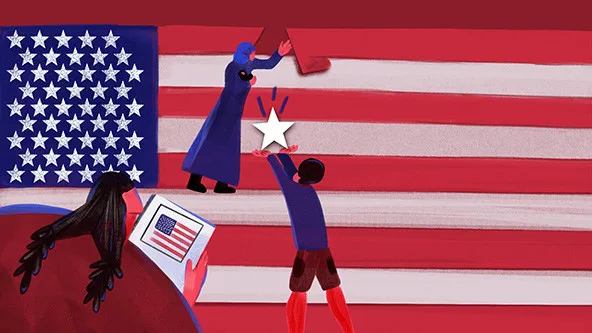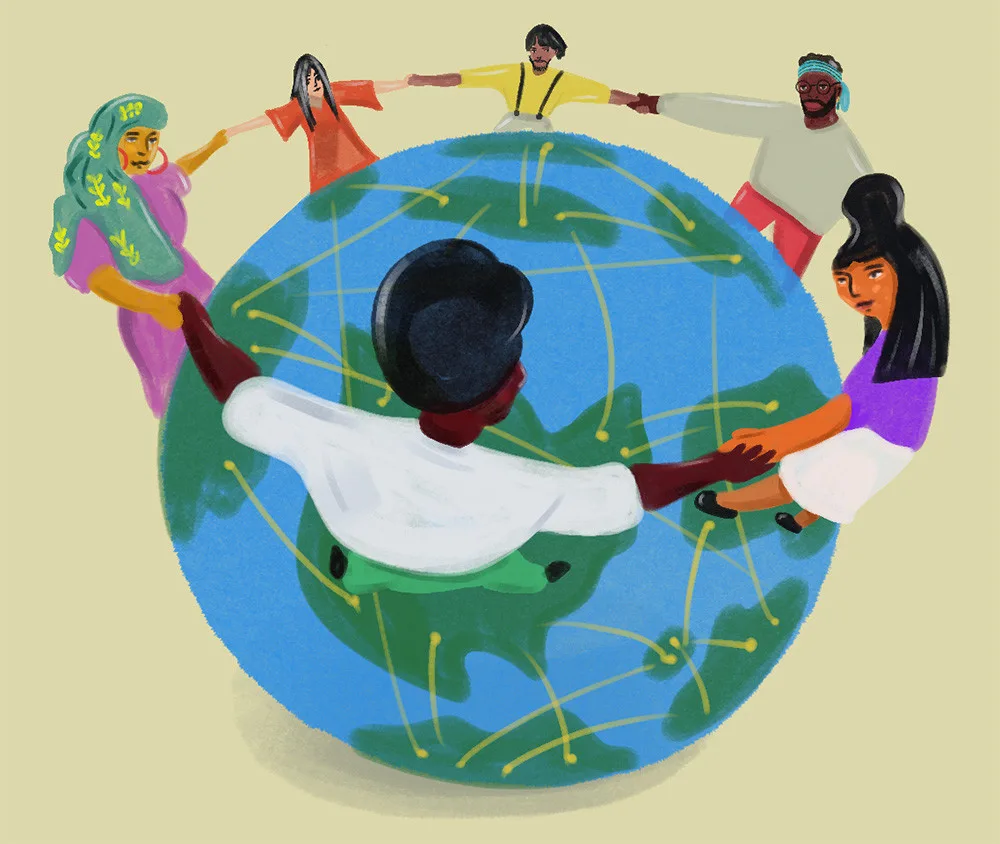
(Illustration by Raffi Marhaba, The Dream Creative)
Since the insurrection at the capitol building on January 6, a common refrain in the United States has been that the country’s democracy is “under threat.” And yet, hasn’t democracy always been under threat in the United States? Perhaps, to put it more precisely, it has never existed. The nation’s history is defined by the struggle to secure rights and protections for all people, because, from its founding to the present, it has never realized the core principles of democracy: political equality, fundamental rights, and equal protection. For over 250 years, Black people were enslaved and denied every right while being subject to physical and mental torture, and in the subsequent century—save for the brief period of Black Reconstruction—Black citizens were subject to legalized discrimination in every facet of life, including voting, housing, employment, public accommodation, and health care. Black people continue to face limitations on the full exercise of their rights, from racist criminal justice policies to voter suppression. These violations have led to governments elected by and for a wealthy and white few, who entrenched their power through exploitation, dehumanization, and exclusion.
Activists, scholars, and researchers across generations have argued that reparations are the way to bring this anti-democratic history to a close. In the United States, most people think of reparations exclusively as cash payments to Black people, and it’s true that financial restitution has always been part of the conversation. But to fully make reparations for the violations of Black people’s rights, we must do more: We must create the conditions for a true multiracial democracy. Reparations go beyond the financial; they mean demanding the cessation of policies that infringe on Black peoples’ rights and suppress Black political power. Reparations also demand that we learn from the ways the United States has violated core democratic principles, and redress that harm by creating a political system where the tenets of democracy are extended to everyone.

The Global Pursuit of Equity
Recent economic and cultural shifts have opened a window of opportunity. Massive and expanding wealth inequality has given rise to two generations of young people who are ready to rewrite the economic status quo. The response to the pandemic has illustrated that government can make massive financial investments in our collective economic well-being. Finally, the decade-strong movement for Black lives—arguably the largest such movement in US history—has activated millions to seek justice for state violence against Black people. The country is ready for reparations.
Reparations Repair Violations of Core Democratic Principles
Meaningfully ending a violation of democratic principles requires repairing the harm it caused. Reparations, in this context, means a comprehensive federal program that would repair the impacts of slavery and its legacies of discriminatory policies.
To begin, we must be clear on the violations of our democratic principles and what racial repair entails. The reforms below align with the UN framework—which articulates restitution, compensation, rehabilitation, satisfaction, and the cessation of harm/guarantee of non-repetition as the five forms of necessary reparations—and map to democratic violations. Each responds to specific harms faced exclusively or disproportionately by Black people in the United States.
1. Political Equality
Political equality is the idea that citizens should have equal voice over government decisions, yet Black people have been excluded from political and governing processes since the country’s founding. And if the Civil Rights Act and Voting Rights Act were instrumental in securing protections for political equality, the disastrous Shelby County v. Holder decision has paved the way for renewed voter suppression efforts, restrictions on voting, and gerrymandering that are collectively designed to disproportionately disenfranchise Black voters. However, political inequality goes beyond unequal representation. Racism has been manufactured as a tool to protect the existing distribution of wealth and power, and for the entrenchment of authoritarian views. Throughout our history, the narrative that Black people are sub-human, lazy, or stupid has been used justify policies that exploit and dehumanize Black communities, many of which persist to this day. Critical elements of racial repair for this democratic violation include:
- Dismantling barriers to voting for Black Americans and for all Americans. We must reinstate the pre-clearance rules established in the 1965 Voting Rights Act and prevent states from changing their laws in ways that result in discrimination against Black voters, and restore voting rights to incarcerated or formerly incarcerated people. (Cessation)
- Ensuring that all votes count equally by amending electoral processes that undemocratically advantage white voters over Black and other non-white voters. The country must reform methods of electing the House and Senate, reimagine the Electoral College, and end gerrymandering. (Cessation, restitution)
2. Fundamental Rights
Fundamental rights, according to the Legal Information Institute, “require a high degree of protection from government encroachment,” and include liberty, self-determination, freedom of movement, and freedom of association. Without the protection of these rights, democracies become illiberal, with a majority able to infringe upon civil liberties of a minority and squash dissent.
Political inequality drives the violations of our fundamental rights. Even after emancipation, politicians worked to re-entrench hierarchies through the convict leasing system and “Black Codes” that allowed Southern states to imprison Black people for trivial offenses and then lease their unpaid labor to private companies. Black people subject to lynching and the destruction of their communities were denied avenues for meaningful recourse.
Today, prisons continue to employ the labor of incarcerated people, often for no pay, which disproportionately affects Black people. Police brutality and killings are among the most visible examples of the state’s control over the lives of Black people, but US health care discriminates against Black women at every turn; denying their pain, sterilizing their bodies, and providing substandard care has led to a Black maternal mortality rate three times that of white women. The systemic reasons why Black women—and especially poor Black women—bear the brunt of such policy date back to chattel slavery. Critical elements of racial repair include:
- Ending involuntary servitude, solitary confinement, and mass incarceration. Repairing the harm these institutions have caused requires that state and federal governments eliminate exceptions for slavery when used as punishment for a crime. They must overhaul the criminal legal system’s approach to punishment and deepen commitment to restorative justice practices. (Cessation, restitution, rehabilitation)
- Returning stolen land to Black and Indigenous people whose ancestors’ land was stolen. (Compensation, restitution)
- Transforming current systems of policing toward restorative practices rooted in community accountability, and investing more heavily in non-police forms of violence interruption and violence prevention. (Restitution, rehabilitation)
- Documenting the harms of state-sanctioned violence against Black people and building accountability mechanisms for non-repetition. This might look like monuments, museums, and other memorials dedicated to public education about how and why these harms occurred, similar to Germany’s cultural memory of the Holocaust. (Cessation, satisfaction)
3. Equal Protection and the Rule of Law
The rule of law means equal protection: Governing must be impartial, and the state cannot draw distinctions between individuals. Yet the right to participate in democracy was long limited to wealthy, white men, who wielded the law explicitly to discriminate against Black people. Even after emancipation, Black people experienced unequal treatment in places of public accommodation, had access to lower-quality public services, and attended the least-funded schools, while massive investments in American workers—like the New Deal and the G.I. Bill—were largely restricted to white people. Redlining by governments and banks created segregated Black neighborhoods that could not access wealth-building financial instruments, neighborhoods that were disproportionately targeted during “urban renewal” that turned them over to private developers. Meanwhile, drug policy has heavily criminalized substances more prevalent in Black communities. Critical elements of racial repair include:
- Making significant wealth-building investments in, and direct payments to, Black communities to remedy the systematic theft of trillions of dollars. These investments would serve as an important step toward the state fulfilling its obligation to redress violations of equal protection, including direct payments to Black families, support for homeownership and building home equity, increased funding for Black educational institutions, and support for Black health care and healing. Redress for Japanese-American incarceration, South African apartheid, and cultural genocide in Canadian residential schools offer models and lessons for reparations payments. (Compensation, rehabilitation)
- Guaranteeing benefits to descendants of Black people excluded from government social programs like the G.I. Bill, as well as legislation that was considered “universal” but that excluded Black people and their families. (Compensation)
The Social Sector’s Role
While these reforms are not comprehensive—the country will need to develop many other financial and non-financial components over time—they are important starting points. Moving forward on them requires significant and sustained narrative change, grassroots organizing, policy advocacy, and movement infrastructure. We must clarify for more people how this agenda will improve their own lives and the lives of those they care about. We must prepare people to take collective action that pressures policy makers to act. Finally, we must build, test, and iterate on alternatives to the status quo to design policies that will ultimately repair democracy.
Efforts to date have yielded tremendous success. Policy makers and protestors across the country have torn down monuments to the Confederacy. Involuntary servitude has ended in states across the country. Support for cash payments to Black people—one component of reparations—has risen 15 percent in the last 25 years. Still, it will take the dedication of millions of people to realize change and sustain it. Funders, nonprofits, and policy makers will each play a role.
1. Funders should invest in the reparations ecosystem as part of their work to secure democracy. Organizations across the country are advancing the reparations movement. Equity and Transformation
is pioneering a model for reparations for the War on Drugs; the Black Veterans Project is pushing for redress for discrimination against Black veterans; and the storytellers at Color Farm Media and Kinfolk are working to elevate examples of Black leaders who fight for justice and repair.
2. Organizations working in the democracy and reparations spaces can programmatically and narratively tie their work together. Democracy organizations must consider whether their policy priorities are combating anti-Black policies. Groups like the Rockefeller Brothers Fund have recognized that anti-Black narratives are among the most effective tools for undermining democracy and that work to fortify democracy must be rooted in a reparative frame.
At the same time, reparations organizations should elevate democracy as a narrative area of opportunity. Groups such as Get Free are connecting the two, leveraging people’s commitment to creating multiracial democracy into building a broader coalition for reparations. As reparations organizations look to define their vision and policy goals, they must recognize the importance of democracy reform in achieving and sustaining Black freedom.
3. Policy makers can also advance solutions at the intersection of reparations and democracy, and be explicit about their support for reparations policy. Local and state-level politicians can commit themselves to studying the harm to Black people caused by their government’s policies, and passing policies that identify and remedy that harm. In Evanston, Ill., Alderman Robin Rue Simmons led the development of one of the first municipally funded reparations policies, in which $25,000 in restorative housing payments are being made to Black residents (or their descendants) harmed by discriminatory housing policies. State and local policy work is essential to building the groundswell of support needed to pass comprehensive federal reparations policy.
Reparations Are About All of Us
For centuries, Black-led multiracial coalitions have fought for true democracy as those with power safeguarded their status through the undemocratic dehumanization, abuse, and exclusion of Black people. The fight to abolish slavery and the Reconstruction era resulted in the 13th, 14th, and 15th Amendments, securing a vast array of protections that ultimately guaranteed Constitutional rights to privacy, marriage, and (for a time) abortion. The Civil Rights Movement, and the subsequent Civil Rights and Voting Rights Acts, have helped to create an entirely new country, where far more rights are guaranteed to far more people. In the same way, the movement for reparations can facilitate a larger social transformation that protects our liberties and enables more of us to realize health, wealth, and joy.
True multiracial democracy is not possible without reparations. And the histories of colonialism, imperialism, exploitation, and slavery are global; other nations that aspire to democratic principles must consider the kind of repair needed to address state harm. And while this often involves Indigenous, tribal, or Afro-descendant communities, reparations are also applicable across national lines. Groups and individuals across the Caribbean, South America, South Asia, and Africa are calling on the United Kingdom, France, Spain, and other imperial powers to make reparations for centuries of harmful and extractive policies.
Making reparations is the project of this generation because securing democracy will be the defining challenge of our time. More than an opportunity to redress the injustices exacted on Black people, it builds toward economic and social equality. Only then can we realize a country that is whole, committed to ongoing repair, and ready to practice the fullest form of democracy imaginable.
Support SSIR’s coverage of cross-sector solutions to global challenges.
Help us further the reach of innovative ideas. Donate today.
Read more stories by Nicole Carty, Aria Florant & Vikas Maturi.


